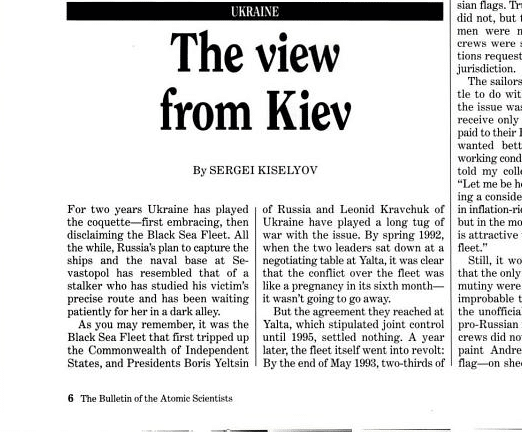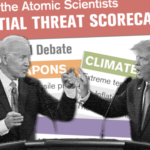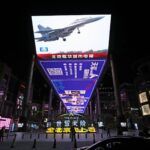History seldom repeats itself but sometimes rhymes—with Crimea
By Dan Drollette Jr | March 19, 2014

“‘Protecting the country from Russia’ is not an inspiring mission for Ukrainian officers, most of whom are ethnic Russians … No one knows what kind of a war Ukraine would fight. But the soldiers do know that their equipment is outdated, and that no new types of weapons are being developed or bought. Ukrainian soldiers know that in a tough fight they would be ‘dead meat,’ not victors.”
The previous sentences may sound ripped from today’s news, but they were actually published in the Bulletin more than 20 years ago. Current readers of the 1994 piece, written by Oleg Strekal, a staffer for the Ukraine bureau of the German newsmagazine Der Spiegel, will find enough parallels to the present to inspire a solid sense of déjà vu: The story said some Black Sea Fleet officers supported politicians who wanted Crimea to break away from Ukraine, while other Ukrainian military officers “openly lend support to a Ukrainian nationalist ‘self-defense’ group, which they provide with testing grounds and equipment.” (In an unexpected twist, the story also noted that one Russian defense minister was kicked out because of his extreme political statements about regaining Ukrainian territory; he probably would be promoted today.)
Strekal’s article, “No way to run an army,” described the governmental malaise that already gripped Ukraine, just two years after it gained independence, and also remarked on the ferocity of Ukraine’s east-west divide. Even at that time, tensions were high, which could be detected in the hazing of new conscripts for the Ukrainian army: “[In] eastern Ukraine, recruits from western Ukraine are beaten for being banderovtsy (a derogatory term for a Ukrainian), and in the west, recruits from the east are beaten for being moskali (a derogatory term for a Russian),” Strekal wrote.
Further back in the Bulletin’s archives is an interesting take from Cornell University vice president of public affairs Steven Muller, who wrote this not long after the 1968 Soviet occupation of Czechoslovakia: “The Russian intervention was not intended as an aggressive move against the West but rather as a defensive measure against a protectorate that seemed to be getting out of hand”—which could be one interpretation of what has been happening these days in regard to Russia and its main Black Sea naval base in Crimea. In his 1969 article, Muller went on to say—in words with remarkable resonance today—that the occupation of Czechoslovakia “came as a great shock to everyone in the West. It evoked a great outcry of anger, revulsion and disappointment, but this sank down almost immediately to frustrated mutterings of helpless resignation … [T]here is simply no way short of war to prevent the Soviet Union from doing just about anything it pleases in the East European Warsaw Pact countries.”
Perhaps the most interestingly prescient views on Ukraine and Crimea from the Bulletin’s past are seen in a pair of dueling articles in the November 1993 issue with the telling titles “The view from Moscow” (by Sergei Leskov) and “The view from Kiev” (by Sergei Kiselyov). Besides sharing a first name, both writers were former Bulletin fellows, and both were journalists: Leskov for the Moscow-based Izvestia, and Kiselyov for Kiev’s Literaturnaya Gazeta. But there the commonality ends.
Leskov wrote in “The view from Moscow” of the enormous symbolic power of Crimea to Russians. News documentaries to this day remind us that this is the place that endured an epic siege from combined British, French, and allied forces during the Crimean War, where Tolstoy served in the front lines, where Chekhov wrote many of his stories, and where the Czar’s ministers and later Communist apparatchiks frolicked. Leskov quoted a local: “I personally have one feeling left—that of patriotism. The Russian fleet was started at the Black Sea; our legendary victories were won there. As it is, we have given up a lot of what is ours to our friends and neighbors, who sell us out at the first opportunity. It’s time to get back what we have scattered. The bigger the country, the better.”
In contrast, Kiselyov wrote that many Ukrainians were concerned about losing their sense of self to their giant neighbor: “They fear that all the attributes of statehood—a president, a parliament, an army—will become mere decorations in a country that, like a banana republic, will be merely a dependency.” This feeling was particularly true in regard to the Ukrainian navy: “As one (Ukrainian) worker complained, ‘Russia has remained an empire with everything that name implies. The fleet does not only mean military might. It is also a symbol of the country’s independence, a sign of Ukrainian sovereignty. To give up the fleet is the same as giving up your arms, your flag, your language . . . it means that Ukraine will again be in bondage to Russia.’”
Kiselyov considered Russia a watchful predator; in the opening lines of his article, he wrote “Russia’s plan to capture the ships and the naval base at Sevastopol has resembled that of a stalker who has studied his victim’s precise route and has been waiting patiently for her in a dark alley.” He also found Ukrainians none too hopeful about the future, because Russia would always hold a trump card in any crisis: the ability to cut off supplies of oil and gas to Ukraine.
Kiselyov’s ultimate take on the future, more than two decades ago?
“Time is on Russia’s side. It will probably not soften its position, and it will probably take advantage of circumstances to encourage Crimean separatist aspirations.”
Together, we make the world safer.
The Bulletin elevates expert voices above the noise. But as an independent nonprofit organization, our operations depend on the support of readers like you. Help us continue to deliver quality journalism that holds leaders accountable. Your support of our work at any level is important. In return, we promise our coverage will be understandable, influential, vigilant, solution-oriented, and fair-minded. Together we can make a difference.
Topics: Analysis, Special Topics














